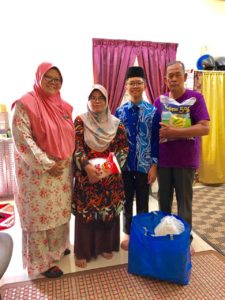I have 55 students in this section. TEASLIANs. They are fun, quick-witted and some of them are serious and studious. Some are playful but of course, they are among the selected ones to be in this programme. Since it was conducted in a big examination hall at Rahman Putra College (KRP), I was thinking that perhaps it would be better if I put the best wishes card on their table and thus, it will differentiate my students from other students in different sections. Attaboy!
When I announced it to the students before they entered the exam hall that my students would get a card on their table, I noticed that some other students were sighing because it is as if I am treating my students favorably as compared to their lecturers. This is one of the things that I learn when I was at school: Always make your students feel special even though you are assertive (tegas). Jim Henson (the famous puppeteer and creator of Sesame Street) once said “Kids don’t remember what you try to teach them but they remember what you are”. On top of that, taking examination could be stressful to some students and one of the things that can decrease stress is to change the emotion into positive one. When you get something from your lecturer i.e. a card whereas the other students from different sections get nothing, you feel special. It is important to make others feel good about themselves.
[Note: Of course this makes the other students who belong to different sections feel envious because they don’t get any best wishes card. I apologise for that. I don’t know them though because they are not my students even though they are the School of Education, UTM students 😀]
Feeling special makes them feel happy and this indirectly will decrease their stress. When they got to their seat and looked at the card, I saw that majority of them smile. They started to loosen up a bit. Some of them looked at the back of the card, checking if I wrote something else. Well, to tell the truth, I didn’t have time to write for each and every 55 cards that I would give them. I just got the cards last Monday (two days before their exam).
How to make your student feel special at the same time being assertive? This is not an easy task. But I believe in the small things that you do which matter. You have to show your concern in various ways. You can make students feel special in many ways. Of course, if you give them a card, it means that you need to invest. But, it is not that costly. For 300 cards, I just spent less than RM100. The card is color printed and to make it extra special in which they cannot find it elsewhere or at store, I designed it myself using Canva.
I admit that there are times when I lost control of my emotion in class (when I was doing my LI), but at the end of the day, I want to let the students know that I care about them. I got mad not because I hate them, but I hate their attitude such as being lazy, or not taking serious thing seriously.
Alhamdulillah I never blew off my steam with my UG students this semester. Attaboy! Because I see unlimited potentials in them regardless what they do in class (even though some of them fell asleep, went out for a while to have a break by eating lunch while I was teaching in class, colored their hair yellow, brunette, purplish shade etc.) . Of course, I just observed them from afar because I know that as adult learners, they are responsible for their own learning. I guess I am using the examples that were portrayed by my former mentors when I was in IIUM. They were relax and cool. I enjoyed being in and taking their classes even though I knew that they couldn’t teach all the courses that I have to take in order to complete my degree.
As a teacher/lecturer (you name it, it is just a term but basically what I do is still the same – teaching), you always want the best for your students. I know that it is not easy to create an ever lasting bond with my students. But, I hope that they would remember me for who I am and they would remember the warm fuzzy feeling they feel on the day they took my examination due to the card I gave them. Perhaps I am the only teacher/lecturer that ever would give them a best wishes card before exam (tongue in cheek remark!).
P.S: If I teach the same students in another course, I guess I have to give them different things, not card. A best wishes bookmark, perhaps 😀





